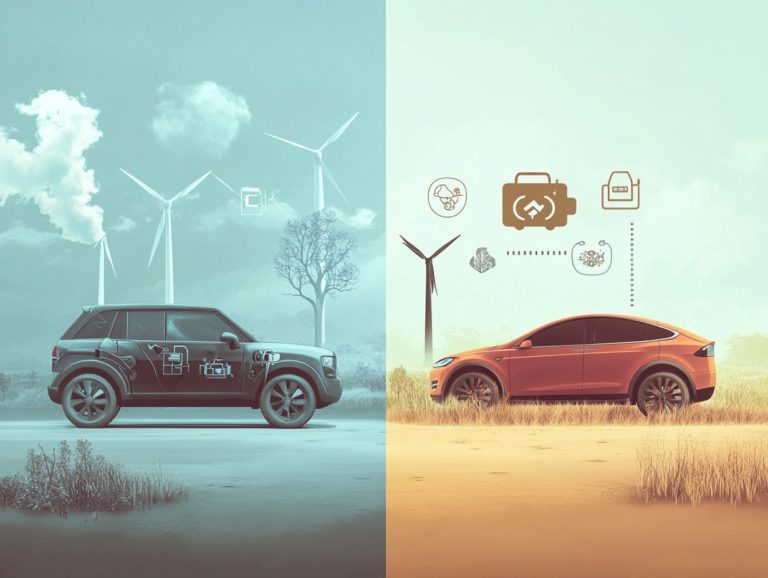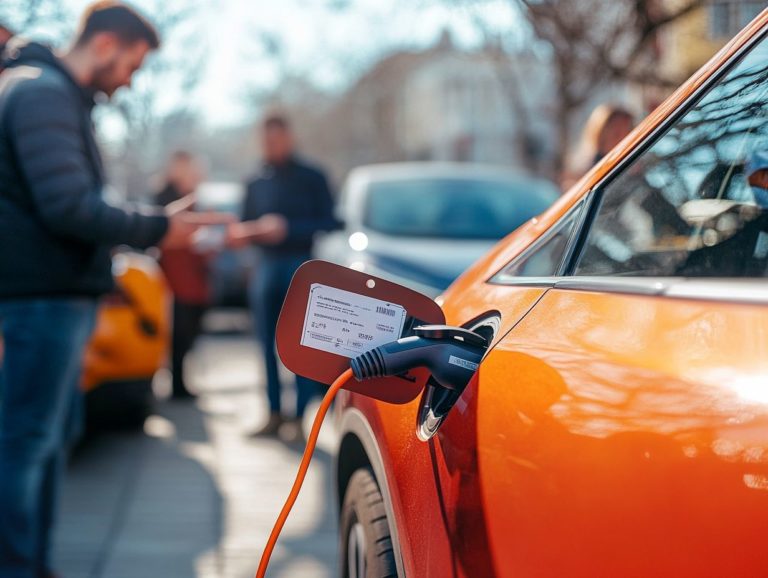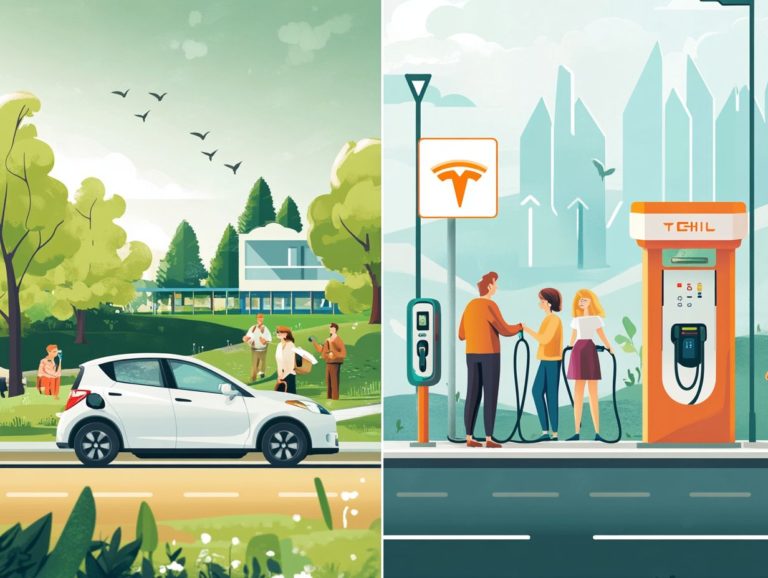can electric vehicles tow heavy loads?
Electric vehicles (EVs) are revolutionizing transportation! Have you ever wondered how they stack up when it comes to towing?
This article delves into the essentials of electric vehicles, covering their various types and distinctive features. It highlights the advantages of using EVs for towing, such as efficiency and a positive environmental impact. It also tackles the challenges they encounter, like battery capacity and towing performance.
You ll learn how to evaluate whether an electric vehicle meets your towing requirements. You ll also find practical tips to ensure that your towing experience with an EV is both safe and effective.
Contents
- Key Takeaways:
- Understanding Electric Vehicles
- Benefits of Electric Vehicles for Towing
- Challenges of Towing with Electric Vehicles
- How to Determine if an Electric Vehicle Can Tow
- Electric Vehicles That Are Capable of Towing
- Tips for Towing with an Electric Vehicle
- Frequently Asked Questions
- Can electric vehicles tow heavy loads?
- What is the maximum weight an electric vehicle can tow?
- Do electric vehicles tow as well as gas or diesel vehicles?
- How does towing impact an electric vehicle’s battery life?
- What should you consider when towing with an electric vehicle?
- Can electric vehicles tow in all weather conditions?
Key Takeaways:

Electric vehicles can tow heavy loads. However, their towing capacity and performance may vary depending on factors like battery capacity and range.
Using an electric vehicle for towing can lead to efficiency and cost savings. It also has a positive impact on the environment.
When considering an electric vehicle for towing, make sure to research factors such as towing capacity, battery capacity, and range to determine its suitability for your specific needs.
Understanding Electric Vehicles
Understanding electric vehicles (EVs) means diving into cutting-edge technology, including electric motors and battery state-of-charge monitoring. These systems are designed to enhance driving performance.
Consider popular models like the Ford F-150 Lightning and Rivian R1T; they are not just vehicles but pioneers reshaping the automotive landscape, especially in the electric pickup truck arena.
With remarkable strides in range prediction and battery efficiency, the future of EVs looks promising and sustainable. Think public chargers and DC fast charging stations!
Plus, features like automated driving and enhanced towing capacity are setting new standards in the industry.
What are Electric Vehicles?
Electric vehicles (EVs) represent a captivating array of vehicles that operate entirely or partially on electric energy. This includes battery electric vehicles (BEVs) and hybrid electric vehicles (HEVs).
These advanced modes of transportation showcase technology that enhances their appeal. They feature systems that help recharge the battery while driving and electric drivetrains that boost energy efficiency.
Unlike conventional gas-powered cars, which depend on internal combustion engines, EVs produce zero tailpipe emissions. This positions them as a more sustainable option for our planet.
The transition to electric mobility helps in reducing greenhouse gas emissions. It also paves the way for innovative integration of renewable energy, thanks to versatile charging methods.
As awareness of climate change rises, more people are embracing the multitude of benefits that electric vehicles offer. This includes lower operating costs and a quieter, more serene driving experience.
Types of Electric Vehicles
The landscape of electric vehicles presents several options: battery electric vehicles (BEVs), plug-in hybrid electric vehicles (PHEVs), and hybrid electric vehicles (HEVs). Each offers distinct advantages tailored to your preferences for range and charging convenience.
BEVs operate solely on electric power, granting you zero-emission driving and often delivering superior performance due to instant acceleration. On the other hand, PHEVs blend electric and traditional fuel engines, allowing you to embark on longer journeys without the worry of range anxiety.
HEVs integrate both technologies but typically don t require external charging. This makes them a hassle-free option for those without easy access to charging stations.
When it comes to electric pickup trucks, understanding the varying EV range is essential. These vehicles are designed to meet a spectrum of driving needs, from daily commutes to demanding heavy-duty work applications.
Ready to explore the world of electric towing? Discover your perfect EV today!
Benefits of Electric Vehicles for Towing
Electric vehicles, especially electric pickup trucks such as the Ford F-150 Lightning and Rivian R1T, present a wealth of advantages for towing.
With remarkable towing capacities and cost savings compared to traditional gasoline trucks, these vehicles become incredibly appealing to both outdoor enthusiasts and professionals.
Their high torque output and efficiency redefine towing capabilities.
They offer a more environmentally friendly option, significantly reducing emissions and fuel consumption.
Efficiency and Cost Savings
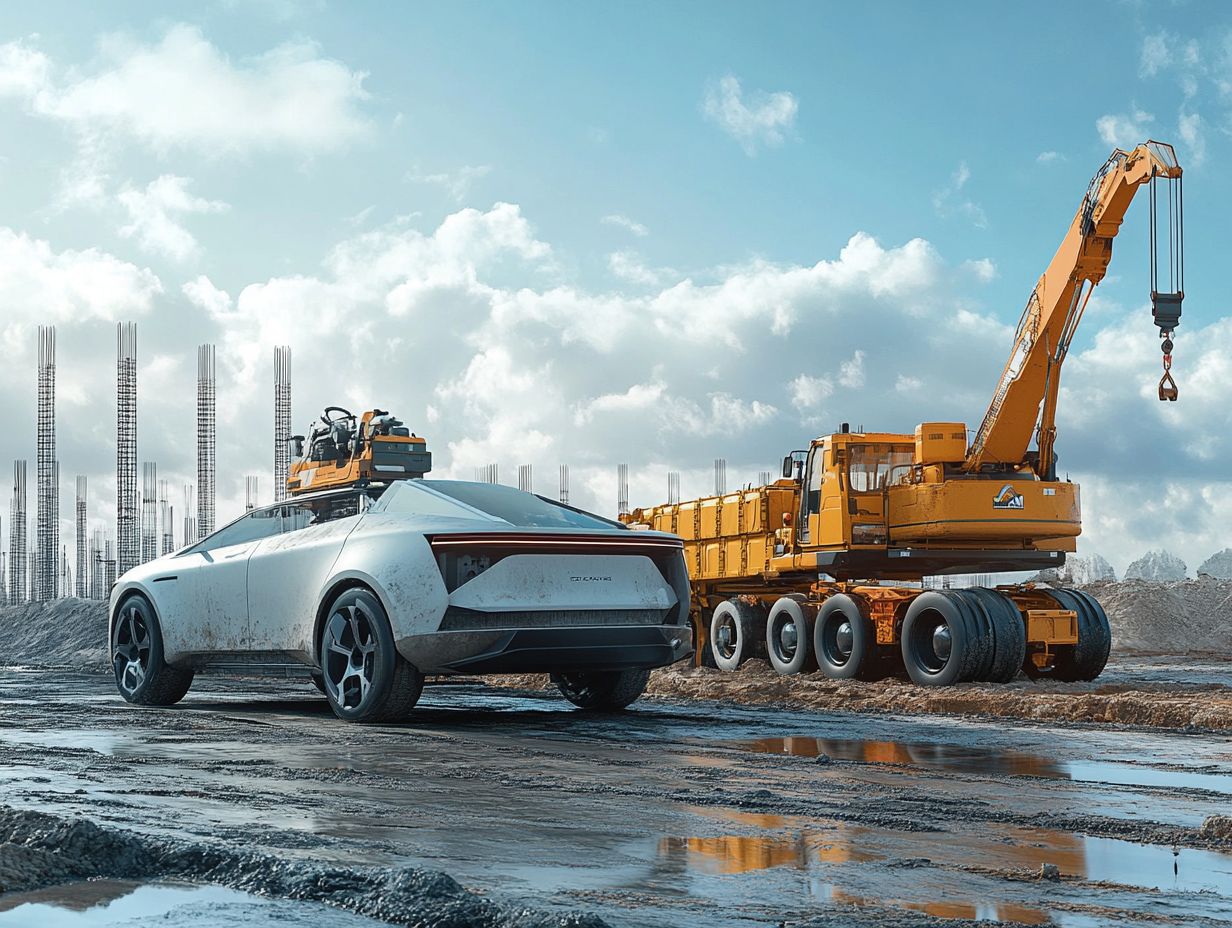
Electric vehicles stand out for their impressive efficiency, translating into substantial cost savings on fuel and maintenance compared to traditional vehicles.
These savings come from the fact that electricity is often more affordable than gasoline in most areas, allowing you to enjoy lower monthly fuel bills.
Fewer moving parts in an electric vehicle’s engine lead to lower maintenance costs. You can say goodbye to oil changes and intricate engine repairs.
Many states and local governments offer financial incentives like tax credits and rebates, further sweetening the deal for those considering electric transportation.
These benefits make electric vehicles a smart investment you won t regret!
Environmental Impact
The environmental impact of electric vehicles is remarkably positive, significantly reducing emissions and promoting eco-friendly driving habits that actively combat climate change.
Make the switch to electric vehicles today and start enjoying these benefits now! You will witness a substantial decrease in greenhouse gas emissions, leading to cleaner air and improved public health in your community.
This change helps fight climate change and boosts renewable energy sources like solar and wind.
As more individuals like you embrace electric mobility, the ripple effects resonate throughout various sectors, promoting sustainable practices and nurturing a culture of environmental responsibility.
Ultimately, adopting EVs allows you to align your personal choices with broader initiatives aimed at preserving our planet for future generations.
Challenges of Towing with Electric Vehicles
While electric vehicles offer considerable advantages for towing, they also encounter challenges such as limitations in battery capacity and range prediction.
These factors can impact towing capacity and overall performance, especially when dealing with heavy loads.
Battery Capacity and Range
Battery capacity plays a pivotal role in determining the EV range, particularly when towing. It directly affects how far you can travel while under load, making it imperative to plan your route with charging stations in mind.
For those who frequently haul trailers or heavy loads, a robust battery capacity is essential. It can significantly reduce your vehicle’s overall range, forcing you to be more strategic in your travels.
When your battery s state of charge dips low, the distance you can cover shrinks even further, creating challenges for both adventurous outings and daily commutes that demand reliable power.
This means that planning your trips requires careful consideration of charging station availability along your chosen route, along with potential detours to keep your vehicle operational.
Understanding how battery capacity influences range while towing is key to optimizing travel efficiency and ensuring your journey remains smooth and enjoyable.
Towing Capacity and Performance
Towing capacity in electric pickup trucks hinges on several key factors, such as torque output and payload capacity, both of which are essential for optimal drive performance.
Torque is the force that helps move heavy loads. The more torque a vehicle has, the better it can pull trailers or heavy objects. The design and engineering of the electric powertrain significantly shape how these vehicles tackle towing tasks.
For instance, electric motors deliver instantaneous torque, providing remarkable acceleration even when you’re hauling heavy loads.
Battery size and weight distribution play pivotal roles in stability and handling during towing.
Additionally, elements like braking systems, drivetrain configuration, and thermal management impact the operational efficiency of electric trucks when faced with demanding towing challenges.
By grasping these elements, you can better assess which electric model might suit your towing needs, ultimately enhancing your overall ownership experience.
How to Determine if an Electric Vehicle Can Tow
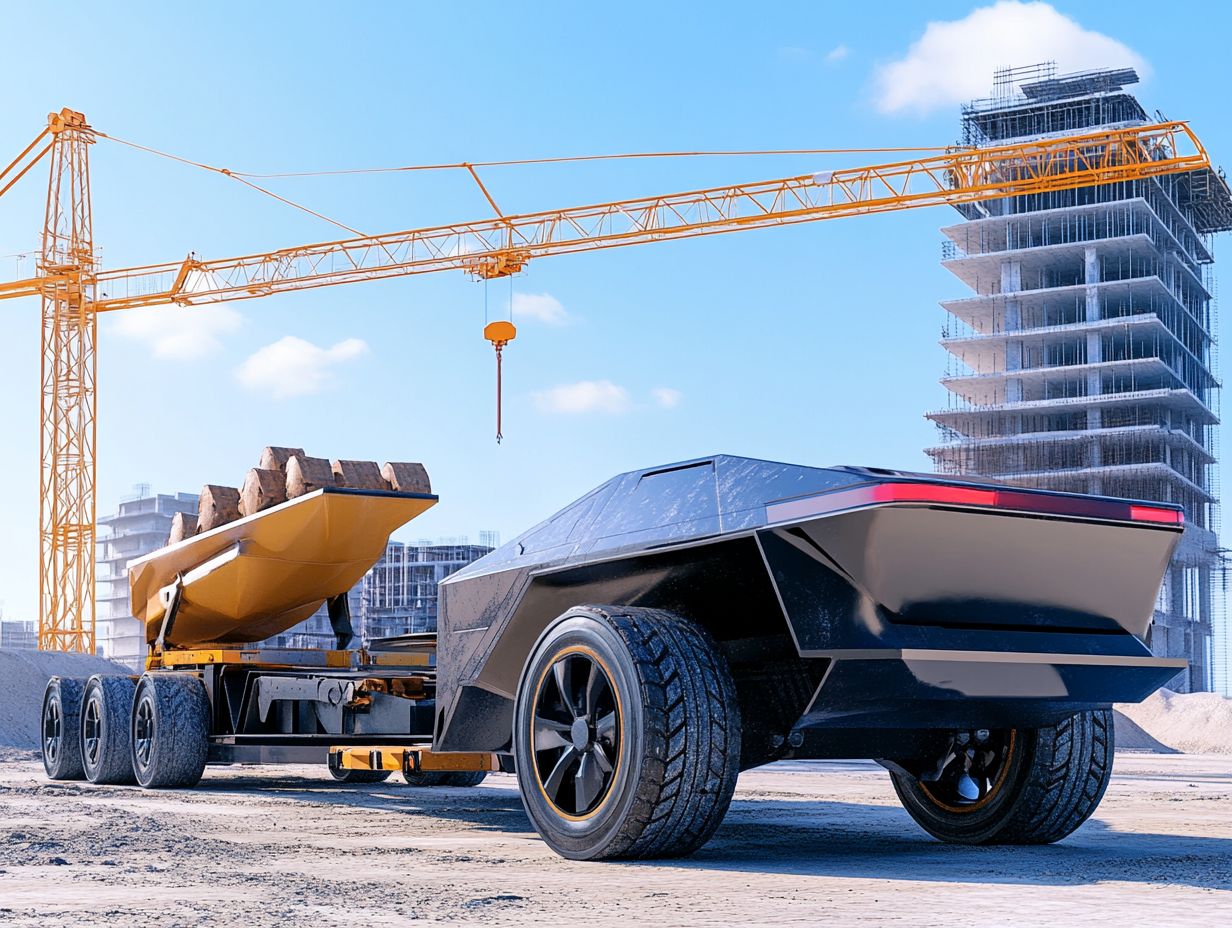
To determine whether an electric vehicle can handle towing duties, check the towing capacity specifications and understand the specific towing requirements for your intended use.
Factors to Consider
- Consider the towing capacity.
- Assess the payload capacity, which indicates how much cargo you can carry.
- Evaluate how different driving conditions might affect performance.
Dive into the vehicle specs to find what it can handle! You need to know the maximum weight it can safely tow without compromising safety or efficiency.
Be mindful that variations in terrain whether navigating steep hills or cruising along flat highways can markedly affect the performance of the electric vehicle while towing.
Extreme temperatures can also impact battery performance and range, so account for these conditions to ensure a seamless towing experience.
Electric Vehicles That Are Capable of Towing
Several electric vehicles available today are expertly engineered for towing. Models such as the Ford F-150 Lightning, Rivian R1T, Chevy Silverado EV, and GMC Hummer EV stand out with their remarkable towing capacities and cutting-edge features.
Top Models and Their Towing Capabilities
Among the elite electric vehicles designed for towing, the Ford F-150 Lightning and Rivian R1T truly shine with impressive towing capabilities and advanced specifications tailored for demanding tasks.
These models are not just vehicles; they re redefining electric mobility, especially when it comes to hauling substantial loads while maintaining performance in challenging conditions.
The F-150 Lightning offers an astounding towing capacity of up to 10,000 pounds when properly equipped, making it perfect for both recreational adventures and professional requirements.
Although the Rivian R1T may have a slightly lower towing capacity, it compensates with innovative features, including a quad-motor setup that enhances traction and stability essential for towing large trailers or boats.
For potential buyers, understanding these specifications is crucial to choosing an electric vehicle that meets their specific towing needs.
Tips for Towing with an Electric Vehicle
Towing with an electric vehicle demands a refined approach and best practices to optimize performance and efficiency.
Consider factors like climate settings and the use of regenerative braking this feature helps recharge the battery while slowing down to ensure a seamless experience.
Best Practices and Precautions

Establishing best practices for towing with electric vehicles requires special attention to safety, a solid understanding of driving performance, and ensuring that your vehicle’s capacity is appropriate for the load.
As electric vehicles (EVs) gain popularity, it’s imperative to understand the unique considerations associated with towing. Properly assess your vehicle’s capabilities; each model has specific towing capacities and limitations that can significantly affect performance.
Familiarize yourself with these specifications before embarking on any towing activity. Your safety protocols should include regular inspections before trips of both your EV and the trailer to ensure that all systems are functioning optimally.
Keep an eye on battery life and road traction to prevent overheating, and utilize regenerative braking to improve control while towing.
Incorporating these practices is crucial for a safe and efficient towing experience.
Ready to tow? Make sure you choose the right electric vehicle!
Frequently Asked Questions
Can electric vehicles tow heavy loads?
Yes, many electric vehicles are designed to have towing capabilities and can tow heavy loads just like traditional gas or diesel vehicles. Factors such as the vehicle’s weight, towing capacity, and the load’s weight all influence towing performance.
What is the maximum weight an electric vehicle can tow?
The maximum weight an electric vehicle can pull varies by model and manufacturer. Some can tow up to 7,000 pounds, while others may only manage around 3,500 pounds.
Do electric vehicles tow as well as gas or diesel vehicles?
Electric vehicles have different engines than gas or diesel ones, but they can often tow just as well, or even better. This is due to their instant torque, which makes towing more efficient.
How does towing impact an electric vehicle’s battery life?
Towing heavy loads can reduce the battery range of an electric vehicle, similar to gas or diesel vehicles. However, features like regenerative braking help recharge the battery during driving, which can offset some energy loss.
What should you consider when towing with an electric vehicle?
Always check the owner’s manual or manufacturer guidelines before towing. Specific instructions may include recommended trailer weight and proper hitch installation.
Can electric vehicles tow in all weather conditions?
Electric vehicles can tow in most weather, but extreme temperatures may impact battery performance. To protect your battery life and ensure safety, avoid towing in extreme heat or cold.



